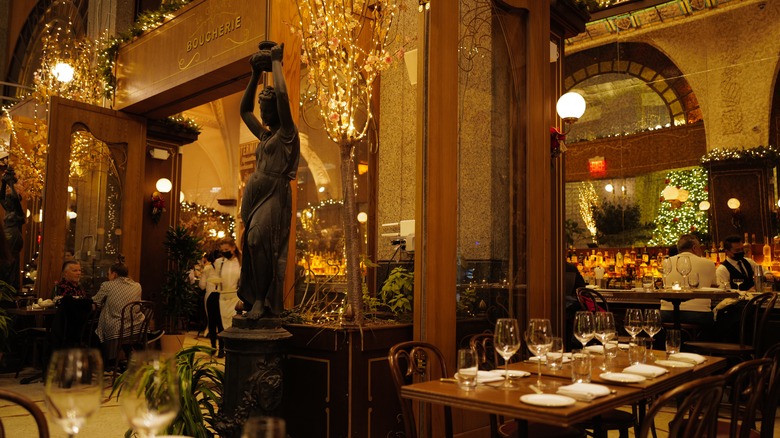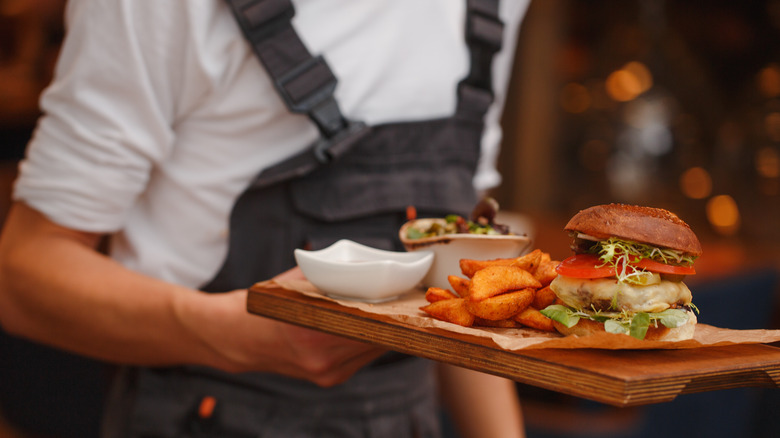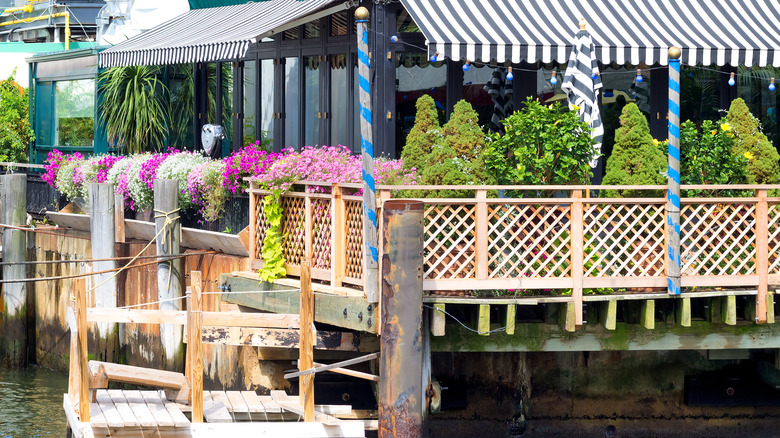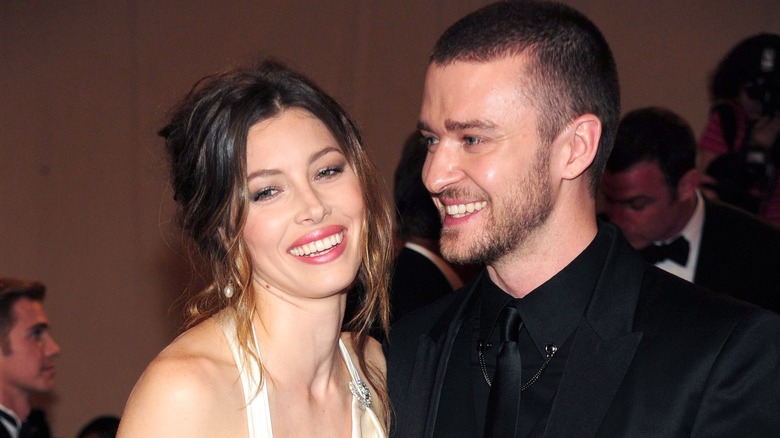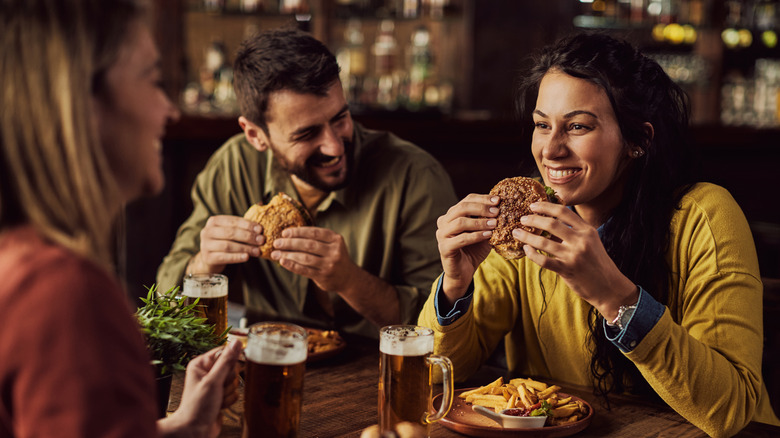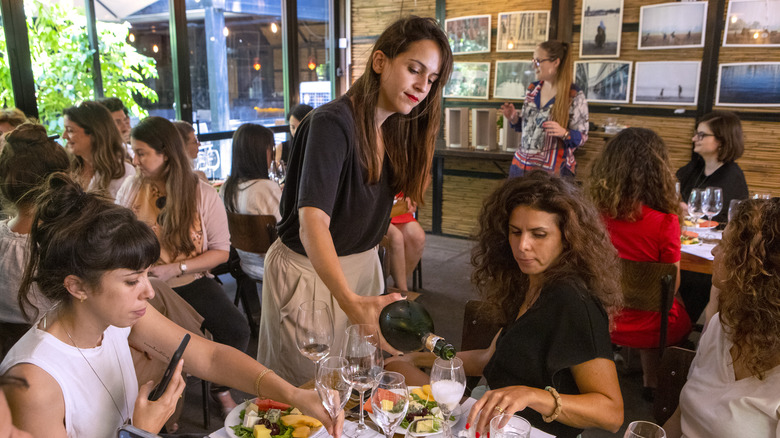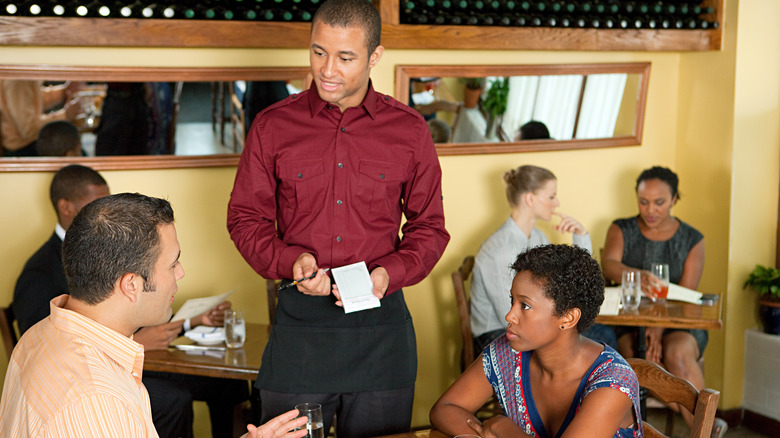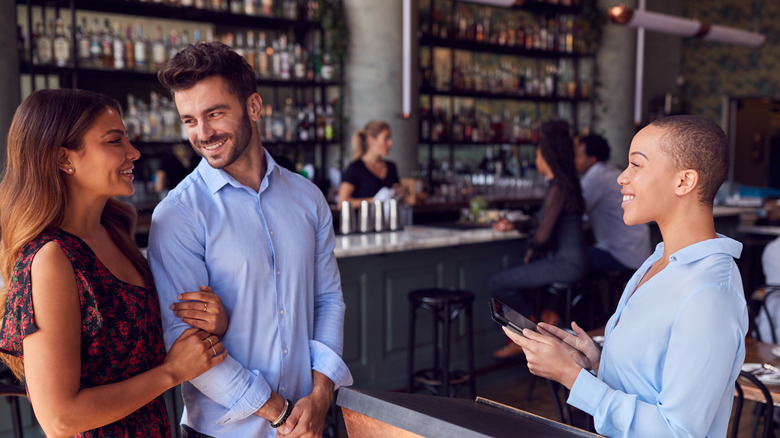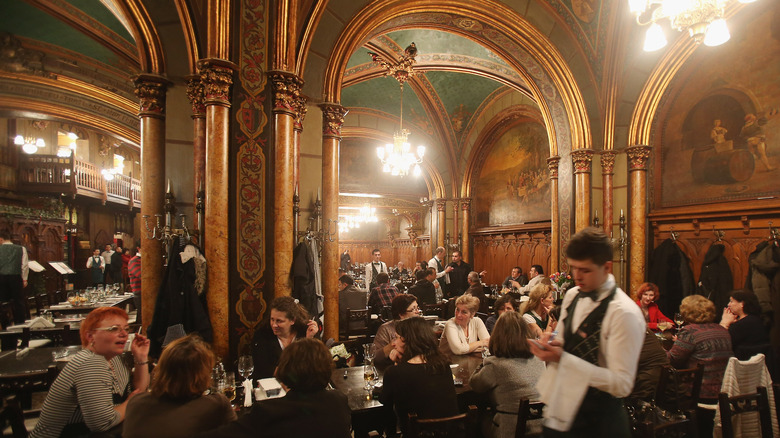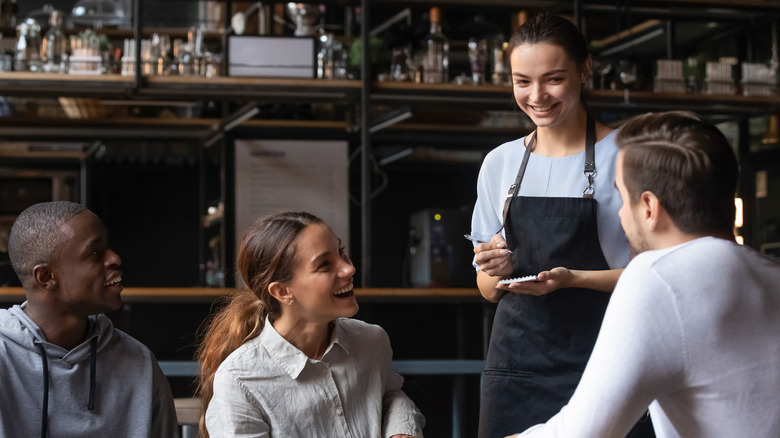Michael Cecchi-Azzolina On What You Should Do When Your Table's Ready - Exclusive Interview
Michael Cecchi-Azzolina must know things that'll go to the grave with him. During his time as a maître d' in New York's most sought-after joints (among them, Le Coucou and The River Café), it's been his job to keep the calm amid the pandemonium. Think all the usual suspects in the restaurant industry: principal among them, difficult clients — but also death and defecation. A mobster might have wanted to kill him. Dustin Hoffman nearly fainted on his restaurant floor. Anna Delvey (aka Sorokin) invited him to train with her personal trainer. Donald and Ivanna Trump tried — and failed miserably — to recruit him. And that's just what Cecchi-Azzolina wrote about in his recently published exposé, "Your Table Is Ready: Tales of a New York City Maitre D'."
Now imagine what he isn't telling you. The New York City restaurant scene, home to the likes of Masaharu Morimoto, Marcus Samuelsson, Eric Ripert, Mario Batali, and Christina Tosi, is as exclusive and ambrosian as it is cutthroat. You'd need a magician to truly navigate it, and Michael Cecchi-Azzolina is among the finest. For a brief time, during this exclusive interview, the long-time maître d' lent his hard-won wisdom to Tasting Table. Read on for exclusive tips that'll change the way you order in a restaurant forever.
Michael Cecchi-Azzolina answers the biggest question in the restaurant industry
You have this wonderful vignette in the book about a job interview where the person asked you, "What's more important: food or service?" What is the most important piece of advice anyone has given you in the restaurant industry?
Wow, that's a good one. There's two things. One is in the first chapter of the book, [something] that [matîre d' Guy Sussini of The Water Club] taught me. Honestly, that has served me my whole career. ... It's really taking care of a guest ...
Danny Meyer said, "What's more important: food or service?" And it always, always comes down to the service for me — not to insult the chefs, who are the hardest-working people in the world. It's such a difficult job, and what they do is amazing, especially [at the] restaurants I've worked in — the food's incredible.
But you'll forgive an overcooked steak [or] you'll forgive an undercooked piece of fish if you're treated in that restaurant with respect. ... It's impossible to [forgive] that rude host at the door who's on his or her phone or the server who is inattentive, doesn't really pay attention to what they're doing, serves your entrée before the appetizers, forgets your dessert, forget[s] your wife's or husband's birthday. Those are things that it's really hard to overcome, and why would you want to go back?
Michael Cecchi's most alarming NYC restaurant experiences
You have navigated your fair share of both unsavory and alarming experiences. You had Dustin Hoffman nearly pass out at a place. ... What's the most alarming situation that you've navigated?
When someone dies, it's very alarming. There is one instance at The River Café when someone actually died and I was on the floor, and that's horrible. Experiencing that is awful. Also, people jumping off the Brooklyn Bridge. It's not a game anymore. You're serving people dinner. It's awful, and it does happen, sadly.
I've had a woman at Raoul's who didn't want to walk up the spiral staircase and went into the back room that was closed that night and urinated on the floor. I had someone poop on the floor at The Tavern. Guests vomit, and you're there cleaning it up. Some pretty awful things happen in restaurants. They're rare, but they do happen.
Michael Cecchi's favorite celebrity restaurant stories
You had regular celebrity bump-ins, from Hoffman to Madonna to Drew Barrymore. Which celebrities did you and the staff most look forward to serving?
There's so many that are so nice and lovely. Then there's your idols who walk in the door. One of mine was Johnny Carson, who was at the maître d' stand. I looked up, and they asked for a table. This guy was in my living room or bedroom for years and years. You're blown away by that. Robert De Niro [or] Al Pacino would come in. Richard Gere. All [are] incredibly lovely people.
Then there are the awful ones, the bad tippers. I wrote in the book, Billy Joel was a terrible tipper, and you hate to see that. Darn it.
Most celebrities are great. Justin Timberlake and his wife are incredible; they're wonderful, wonderful people. Brooke Shields [has] been coming to my restaurants for almost 40 years. You don't see this woman for 10 years, and then she shows up for three weeks in a row, and it's like she was there last week. People [are] so kind and lovely and willing to put away who they are and be a normal person. I don't have that many bad stories of celebrities.
How about a nice story?
Paula Abdul — she was [an] "American Idol" judge. My older daughter loved "American Idol," watched it all the time. Paula Abdul came in, and I had to tell her, "My daughter adores you and watch[es] you all the time." She pulled me in the seat, sat me down, [said] "Let's have a glass of wine," and chatted, and was incredible, wonderful, and lovely.
Sonia Sotomayor, the Supreme Court justice — what? Incredible. [She] was taking pictures with all of us and was as warm and as kind as can be.
Signs you've picked a good restaurant
On your travels with your family, you say you're able to go in and out of restaurants and find with pretty complete confidence a restaurant that is going to serve a decent meal, even without having to read reviews. Can you teach us how to do that?
It's hard to teach because it's an energetic thing, and it's because when you're in the business for this long, you walk in the door and see things that no one else can see.
First of all, it's the attentiveness. If you walk in there, you feel it. You feel that you've walked in from the street and you're in a different place; you're transformed. Even busy places — when you walk in there, there's a vibe where that imbues happiness and a place that people want to be. ... Even [if] the restaurant's dead, if you walk in and the bartender's at the bar and you're right there and [they don't] acknowledge you, or the host at the front door doesn't acknowledge you, or a server in the middle of the room sees you and doesn't give you a smile immediately ... The bartenders [can] look at you and smile and say, "Welcome. Greetings. Be right with you." If you don't get that, you don't want to be there. ...
Second is the lighting. If we're going for dinner and it looks like a bright cafeteria, I know that someone did not take the time to invest in how their restaurant looks and the lighting of it. Is that the lighting that I want to sit in for two hours? Most of the time, it's very difficult to get lighting done right. [Harsh lighting is] obtrusive and it really bugs me. And that might sound ... It's not snobbish, but I want to feel comfortable in the space I'm in.
And the decor. If it's the smallest, smallest bistro or trattoria but there's homey things on the wall and it makes you feel like you're walking into their family, those are the places that I gravitate to. ...
There's so many factors that you look at. Is it clean? You can tell that right away. Are there guests there? Do they look like they're having a great time, or are they just staring off into space?
The best way to order wine at a restaurant
Let's go to the wine ordering process. You talk about getting people to order a nice bottle of wine as being the difference between a really good tip and a mediocre tip. How do you order your bottle of wine at restaurants, and what advice can you give us for ordering a really decent one?
The best way to do it, if there's a sommelier or a server or someone that knows what they're doing, [is to] say, "I want to spend $80 tonight with a bottle of wine. Give me your best bottle. I want a medium-bodied red" or "a full-bodied red" or "This is what I'm eating and this is my price point. Please provide me with that."
That's almost foolproof because they might come back to you and say, "Well, you want to spend $80, but I've got this one for $120," in which case I'm skeptical already because if you're trying to up the sale to me, I don't want to be pushed. I don't want to be led to a place where I don't want to go. But in most restaurants, [if] you say, "My sweet spot is 80 bucks" or 400 bucks, whatever it is, they'll accommodate you, and they're happy to accommodate you.
I'll ask the sommelier. I'll give them my price range: "I'll spend between $80 and $120. Pick what [we'll] drink tonight." I'll put it in their hands. I know a lot about wine, but I guarantee you, of all the restaurants I go to, I'm not going to know three-quarters of the wine list. I've not drunk those bottles. I always rely on the expertise of the person there and give them my price point.
What is a good price range for, say, the New York restaurant scene?
Now, between $90 to $120 is your sweet spot. You'll get the guest that walks in and points to the $10,000 bottle of wine. It happens. And you'll have the guests that think anything above $60 is highway robbery. But most guests are comfortable between $90 to $120.
The upsells you can safely say no to
Are there upsells that you always avoid in a restaurant?
I'm a simple guy. I don't like to spend a lot of money on wine because we have children and I don't make a lot of money. The upsells like the $40 glass of tequila because Clooney loves it or is selling it — I think it's ridiculous. I really do. It's a prestige thing. It's showing that you've got the wherewithal to know this and you have the money to spend on it. I think it's nonsense, to be honest with you.
You can have a wonderful time with a $15 shot of tequila or a simple vodka instead of going for the higher-priced brands, which is all marketing. I guarantee you, [if] you put 10 tequilas in a row and have the regular guest taste [them], they're not going to know the difference between the $40 and the $10 glass. ... You don't have to spend egregiously to have a great time at a restaurant.
Anthony Bourdain, when he wrote his bible back in the day from a back-of-the-house perspective, went through all of the dishes that he avoids ordering at a restaurant with vehemence. You're definitely a front-of-the-house perspective, but are there dishes that you always avoid ordering?
Not usually. What I'm very wary of is seafood. And [it depends] on the day of the week [because] who's getting a seafood delivery on Sunday? The delivery usually comes Friday; you might get it on Saturday. You don't know how long it's been sitting with the purveyor. So Sundays and Mondays, I'm very wary of ordering seafood.
[For] anything with truffles and caviar added to it, the tariff is so enormous usually, I stay away from that because I don't need that. Again, I don't have a lot of money, and I'm not going to spend a lot of money on caviar. If I want to buy caviar, I'll go to my local fishmonger and splurge and have something with the family and do it in a way that's within my means. But if you have bottomless pockets and you want to go for it, go for it. Those dishes do help the restaurants; they help the bottom line.
How to woo a maitre d'
In your years and years of experience as a maître d', what are the top red flags that you encounter when somebody walks up to you wanting a better table, a reservation?
I don't think I ever turn customers away because of who they are, but I'm not going to go the extra mile if you're rude. The number-one gauge of a guest walking in the door is their attitude — how they say hello or not say hello or treat my host that I'm working with or treat me, or [when] sitting at the bar, treat the bartender. It's absolutely attitude. ... It's very simple — just be nice. Most restaurants will bend over backwards for you [and] accommodate you.
And restaurants that don't do that? Well, you know what? Just leave. Walk out of the door, because if they don't want you there, why would you want to be there?
How to finally get that reservation you've been longing for
Can you give us your best tip for getting a table at a restaurant that's fully booked?
Honestly, if it's a restaurant with a maître d', find out the maître d's name. Walk in the door and say, "Hi, Michael. I've not dined here before. It's my wife's birthday. We would really love to come in and have dinner. What can you do for me?" I'll help him or her, absolutely.
When Le Coucou opened, it was the hottest table in New York. Daniel [Rose]'s reputation preceded him. We were booked up the first two months before we opened, just on followers of Chef Daniel Rose. And there was a woman who called the reservationist constantly: "Why can't I get a table? Why can't I table? Who's in charge of tables?" Back then, I wasn't taking phone calls because I like to talk and I know my guests, [so] I'd be on the phone all day long. Everything was done by email.
The reservationist said, "The maître d' is Michael Cecchi." "Can I talk to him?" "He's in service right now. He can't take your phone call." This woman walked in the door one day and announced, "Who's this Michael Cecchi?" I was standing right there. I said it. "Why can't I get a table?" "Well, you haven't asked me. You're here." And she's become a regular customer of mine for the past six years, and I adore her, and that's what she did. She just walked in and was lovely and nice and had that New York attitude. Those are the people that you want to give tables to.
Now, if it's crazy busy and there's no tables available, the chance of you getting one that night is really, really, really slim. But things do happen. Cancellations happen. No-shows happen. If you talk to that person at the door and give that person a $100 bill or a $20 or a $50, if they think they could make it work, that will absolutely help you.
If [the restaurant is] booked and it's very busy and people [are] waiting 20 minutes to 45 minutes, sometimes an hour, for a table, you're not going to bend over backwards [for] someone walking in the door and asking for a table. But if they make it worth your while and they're nice about it and you could possibly do it, it will absolutely help [them]. And it will probably guarantee [them] a table the next time [they] want to be in that restaurant.
Michael Cecchi's guide to restaurant code words
In your book, you describe health inspector protocols where staff have code words [for] when health inspectors walk in. There's a plethora of other restaurant code words that help people communicate short form while in a restaurant. Can you give our readers a couple typical restaurant code words that they might not know exist?
The code word [primarily] is for the health department because you don't want them to know that you're alerting the whole restaurant. There's a phrase [for] when the Department of Health comes in: "When in doubt, throw it out." A lot of food gets thrown out when the health inspector arrives because you just can't meet the standards. It's like not you're going to kill someone; if the temperature's supposed to be 42 degrees and it's 40, it's not a big deal. But a thermometer goes in, and that [could be] $300, $500, $1,000.
We've used "tsunami." I've used "chicken liver." I've used "clay." It's words that people will remember and get passed throughout the whole restaurant. So when the health department comes in, if whoever's at the door knows to stall that person and get someone, and they say as they're walking by, "tsunami" or whatever, they know, "Oh!" And then that word gets spread around to everyone in the restaurant, from the bussers up to the chef.
When the critic is there, it's the same thing. There's always a code word, and that gets spread through the restaurant. You want everyone to know that this is a big moment for us [because it could] cost us a lot of money, either in a bad review or a bad health inspection. You want your restaurant to succeed and ... you want to keep the restaurant open.
[The] margin is small. It's a really, really tough business, and it's a fickle business. Especially in New York City, restaurants are opening constantly. ... So many close. They just don't last. So you need these [code words] to stay on top of your game.
Michael Cecchi-Azzolina's book, "Your Table Is Ready: Tales of a New York City Maitre D'," is available for purchase from Macmillan.
This interview has been edited for clarity.
